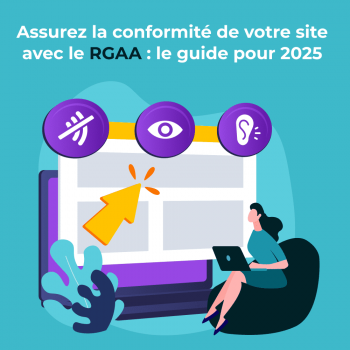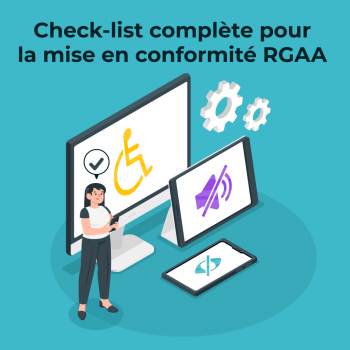In 2025, the European directive on the accessibility of products and services will require businesses to make their websites accessible to everyone, including people with disabilities. To meet this new regulation, it is crucial to comply with the General Accessibility Improvement Reference Framework (RGAA). This article explains how to guarantee your website’s compliance by showcasing our RGAA methodology, UX/UI design expertise, and the penalties for non-compliance.
Starting in 2025, the European directive on accessibility will mandate businesses to ensure their websites are accessible to all, including individuals with disabilities. This regulation, based on the RGAA framework, aims to guarantee an inclusive digital experience and applies to a wide range of organizations, from private companies to public institutions.
Why Act Now?
Delaying compliance can be costly: penalties for non-compliance may reach up to €50,000 for public entities and €25,000 for private companies, not to mention the negative impact on your brand image. However, this obligation goes beyond avoiding penalties. A proactive approach to digital accessibility offers a transformative opportunity:
• Reach a broader audience by making your services accessible to all.
• Enhance your brand image by becoming an inclusive and socially responsible organization.
• Improve overall user experience, boosting retention and conversions.
What Is the RGAA and Why Is It Important for Businesses?
The RGAA (General Accessibility Improvement Reference Framework) is a regulatory framework that enables businesses to make their websites accessible to all individuals, including those with disabilities. Its goal is to ensure seamless and inclusive navigation for all users, regardless of the device they use (desktop, tablet, smartphone).
Web accessibility is a critical issue for businesses, not just to comply with regulations but also to expand their audience. An accessible website is also a more effective and user-friendly website, which positively impacts user retention.
The European Accessibility Directive: Obligations for 2025
As of June 28, 2025, the European accessibility directive will apply to all companies with:
• A turnover exceeding €2 million or more than 10 employees.
• A turnover above €250 million, such as e-commerce companies.
These companies must ensure their digital services comply with RGAA standards. Websites, whether institutional, e-commerce, or service-oriented, will undergo a mandatory accessibility audit to verify compliance.
Need help? We can assist you with this audit by identifying non-compliance areas and providing clear, personalized recommendations to ensure effective and tailored compliance.
✅ Don’t miss our complete checklist! This article outlines all the essential steps for successful RGAA compliance, including key considerations, practical advice, and a guide to organizing your compliance strategy effectively.
Legal Requirements to Ensure Digital Accessibility
To ensure digital accessibility and comply with RGAA requirements, businesses must meet several legal obligations by 2025, including:
1) RGAA Compliance for Digital Services:
All digital services, including website structure, visual content, and interactive elements, must meet the 106 criteria outlined in the RGAA framework. This ensures your information and services are accessible to all users, regardless of their needs or devices. Compliance is not only a legal obligation but also a commitment to an equitable and inclusive user experience.
2) Accessibility Statement:
Publish an accessibility statement on your website that specifies your site’s level of compliance with RGAA criteria, inaccessible content, and methods to report accessibility issues. This statement must be updated regularly to reflect the current accessibility status.
3) Multi-Year Accessibility Plan:
Implement a multi-year plan outlining resources and measures to improve website accessibility over a three-year period. This plan demonstrates long-term commitment to accessibility improvement.
4) Legal Mentions:
Include RGAA compliance levels, the accessibility statement, and the multi-year plan in your website’s legal notices.
Penalties for Non-Compliance with RGAA Standards
Failing to comply with RGAA standards can result in significant financial penalties:
• Up to €50,000 for public entities.
• Up to €25,000 for private companies, especially if the accessibility audit is not conducted within the legal timeframe.
In addition to financial consequences, companies may face reputational damage and legal actions from users, which can have long-lasting negative impacts on their brand image.
How to Avoid Legal Risks Through RGAA Compliance
To avoid these risks, it is essential to anticipate and implement an RGAA compliance strategy now. A preliminary audit, followed by swift compliance actions, will help you not only meet legal requirements but also align with user expectations.
Our Methodology to Support Your Compliance Journey
At Ylly, we have developed a proven methodology to ensure effective and sustainable RGAA compliance. Our approach includes:
- In-depth audits: Identifying non-compliance areas and evaluating priorities.
- Precise recommendations: Offering practical and actionable adjustments.
- Tailored action plans: Crafting a roadmap aligned with your needs and resources.
- Inclusive testing: Involving users with disabilities to validate improvements.
Read our full article for a step-by-step guide to achieving effective and sustainable RGAA compliance.
Turn Accessibility into a Strength for Your Business
Digital accessibility is not just a legal imperative; it is a unique opportunity to strengthen your societal commitment while optimizing your digital performance. Acting now means avoiding penalties while positioning your company as an innovative and inclusive player.
Prepare Your Website for 2025 with Our Digital Accessibility Expertise
RGAA compliance is now a crucial requirement for companies aiming to align with European legislation and deliver optimal user experiences for all. Our teams are ready to support you every step of the way, from initial audits to final validation, ensuring comprehensive and lasting compliance.
Contact us today for a tailored RGAA audit and discover how to turn this obligation into a strategic opportunity.







